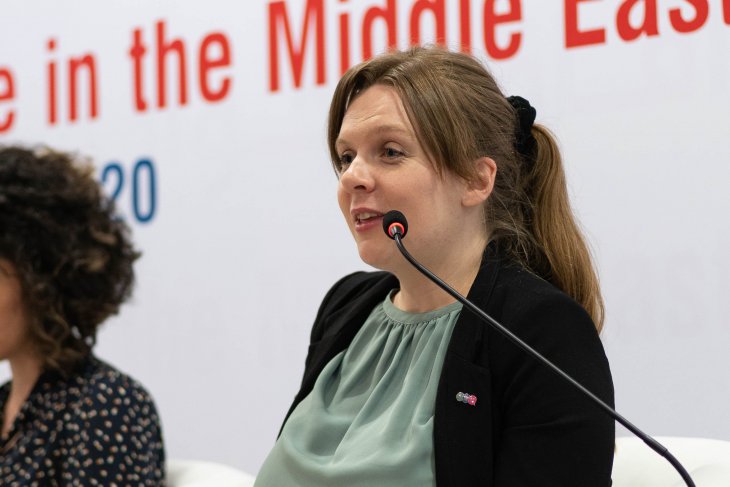Can we improve democracy and promote peace by becoming better at including youth and create spaces for youth participation in political processes? Last week I had the great honor of representing Norwegian youth on a panel discussion about this very topic during a seminar hosted by PRIO during the royal state visit to Jordan. The panel included PRIO Director Henrik Urdal, a representative of the Jordanian Youth Parliament, and the Jordanian Minister for Youth. We all agreed that youth inclusion and participation is key to create a lasting peace and representative democracy, as long as it is done in a way that really takes youth and their opinions seriously.

Rode Margrete Hegstad on the panel in Jordan.
What is real and meaningful youth participation?
One study from Norway indicates that false or tokenistic participation can be harmful and reduce young people’s belief in democracy. Therefore, it is vital that we create mechanisms for participation that really take youth as stakeholders seriously. It is important to start by recognizing that youth have the right to participate and be heard; it is not something we should do only to avoid potential conflicts or be nice. By including youth, we are fulfilling their rights to be heard in all matters which concern them. Furthermore, we as youth have to be included in a way that is meaningful to us. In Norway we have a strong civil society, with many youth-led organizations. In these organizations youth organize and lead themselves, and many young people experience from an early age that their opinion matters and that every member vote counts equally. These values should be applied to politics in general. Young people have the right to represent themselves, and should be recognized as experts on their own lives.
Real and meaningful participation does not mean that young people should always be the ones to make the decisions, or that politicians always have to do as we say. However, we should always be heard and included, and politicians must be held responsible for the decisions they make. Young people should be included both in the formal political processes as candidates and part of the electorate, and through mechanisms which ensure that also those too young to vote are included.
Differences and similarities between Jordan and Norway
Jordan has a much younger population than Norway, with 70% of the population younger than 30 years old. In Norway we have an aging population, but still around 40% of our population is younger than 30. In both countries, youth are underrepresented in all political processes, which means that a large part of the population is left out when the big decisions about our future are being made. In Jordan you have to be 30 years old to run for election to parliament, whereas in Norway we have several parliamentarians and local politicians under the age of 30. Still, if youth were to have a proportional representation based on our share of the population, we should have more than twice as many young politicians in Norway as we have today.
Norway and Jordan also share a challenge with lower participation in elections from youth than from the rest of the population. This can partially explain why youth are underrepresented, but can also be caused by young people feeling left out from political decisions. If our political discourse includes only part of the population, and youth issues are addressed only as a problem in our societies and not as part of the solution for creating peace and an inclusive democracy, young people can be discouraged from participating.
The way forward
I believe that real and meaningful youth participation is the key to creating stable democracies and lasting peace, because young people are important stakeholders in all countries of the world and have a right to be heard. I am glad to see the issue of youth participation on the agenda of such an important seminar, and hope to see progress for youth both in Jordan and Norway in the coming years. It felt really meaningful to be able to take part in this panel discussion, and to be able to share some of our experiences from the Norwegian Children and Youth Council. Strengthening youth-led civil society is important as a way to enable youth to represent themselves, and I think it is great that PRIO wanted to include us as a youth-led movement in these important discussions.
Rode Margrete Hegstad is President of the Norwegian Children and Youth Council (LNU).